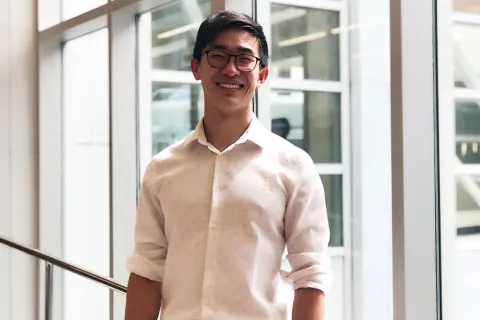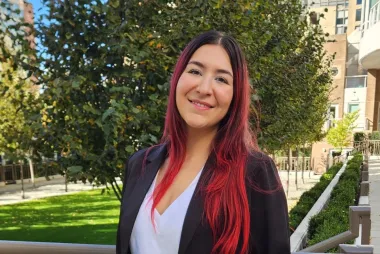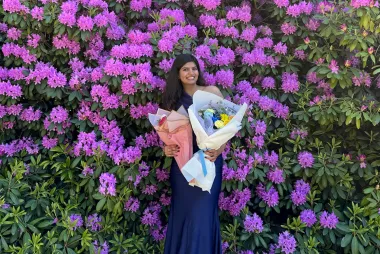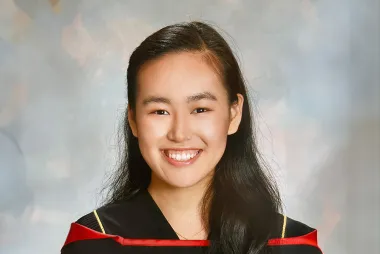"Time spent trying something new is never wasted."

Tony Xu
- Degree:
- Bachelor of Applied Science
- Grad year: 2022
- Program:
- Campus: Vancouver
Hello, my name is Tony. I’m graduating in the summer of 2022 from Electrical Engineering in the Biomedical specialization with a minor in Physics. My five years at UBC has been characterized by an abundance of uncertainty about my future path, but also a curiosity to explore everything the university has to offer. Over my undergraduate degree, I had the chance to do internships, join a design team, go on exchange to Nanyang Technological University in Singapore, and explore research in Astronomy, machine learning, and medical imaging. Having a large variety of interests had at first seemed like a curse. I would move between new projects and passions multiple times a semester without really settling on something to specialize in. It took all these experiences and more to figure out exactly what kind of path I wanted to take.
In the end, I decided to focus on the application of machine learning to improve medical imaging modalities. I think that something that helped me reconcile all of my interests was to consider where they intersected. By thinking creatively about how different topics overlap, I realized changing my interests didn’t necessarily mean I was starting from scratch each time, but rather picking up skills that compounded and could result in insights on how to approach a problem. From trying machine learning, I gained a new way to analyze medical images. Core Electrical Engineering classes revealed the basic operating principles of medical technologies. Even a research project I did on interferometry was helpful, improving my understanding of MRI machines!
This summer, I’ll be exploring Europe and joining Samsung Research America for a short time as a computational scientist intern prior to starting my Ph.D. in the Department of Medical Biophysics at the University of Toronto.
Why did you choose to go into your field of study at UBC?
Even in high school, I was quite sure I wanted to pursue a STEM degree, being fascinated by the natural world and keen to understand it. The main decision I made was to choose between Engineering and Science. The reason I settled on Engineering was because of the program’s focus on application.
What has made your time at UBC memorable?
Throughout my time at UBC, I had two main fields that fascinated me. The first was the application of AI to medical imaging. This interest I largely explored through my time in the Multifaceted Innovations in NeuroTechnology (MINT) design team and a research internship. The second was Astronomy, which I discovered in a class I took for my Physics minor. My investigation into these fields culminated in my final year as two separate thesis projects. If I really think about it, the fact that I was able to concurrently dive into these two interests along with a variety of other opportunities for personal development is amazing! I would certainly be hard-pressed to find similar prospects in a different environment. I would say that this is what made my time at UBC memorable: how easy it is to delve into new things.
Tell us about your experience in your program. What have you learned that is most valuable?
Electrical Engineering is equal parts difficult and rewarding. Throughout my time in the program, the one key takeaway that helped me get through classes was to take failures in stride. It can be easy to fixate on the grade, and take shortcuts to improve short-term performance. However, many things in the program build on previous concepts, and learning them properly the first time will help in the long run. Though it can be tough at the time, I found that doing this made the program feel more manageable in the later years.
What advice would you give a student entering your degree program?
You’ve probably heard it a thousand times before, but it bears repeating: don’t be afraid to take advantage of opportunities, you’ll never know where they might lead you! I strongly believe that putting in time and effort to learn something new will never be a waste of time. Along these lines, I would also encourage you to consider how to reframe and package your experiences to emphasize how they benefit you. For example, rather than discarding a mandatory class as something unrelated to your interests, try to draw parallels between concepts to find skills that might be applicable elsewhere. By doing so, you may even be able to discover specialized areas where you have a unique advantage in!
What are some contributions you would like to make when it comes to the future of work in your field?
Much of the research-related work in my undergraduate degree (including my undergraduate thesis) revolved around the application of machine learning algorithms to digital whole-slide images. These are huge (100,000 pixels by 100,000 pixels) images that capture details on a cellular level of an entire microscope tissue slide. Currently, these slides are manually investigated by medical professionals, which is both time consuming and subjective. In my graduate degree, I would like to work towards the improvement of the reliability, accuracy, and explainability of these algorithms!


